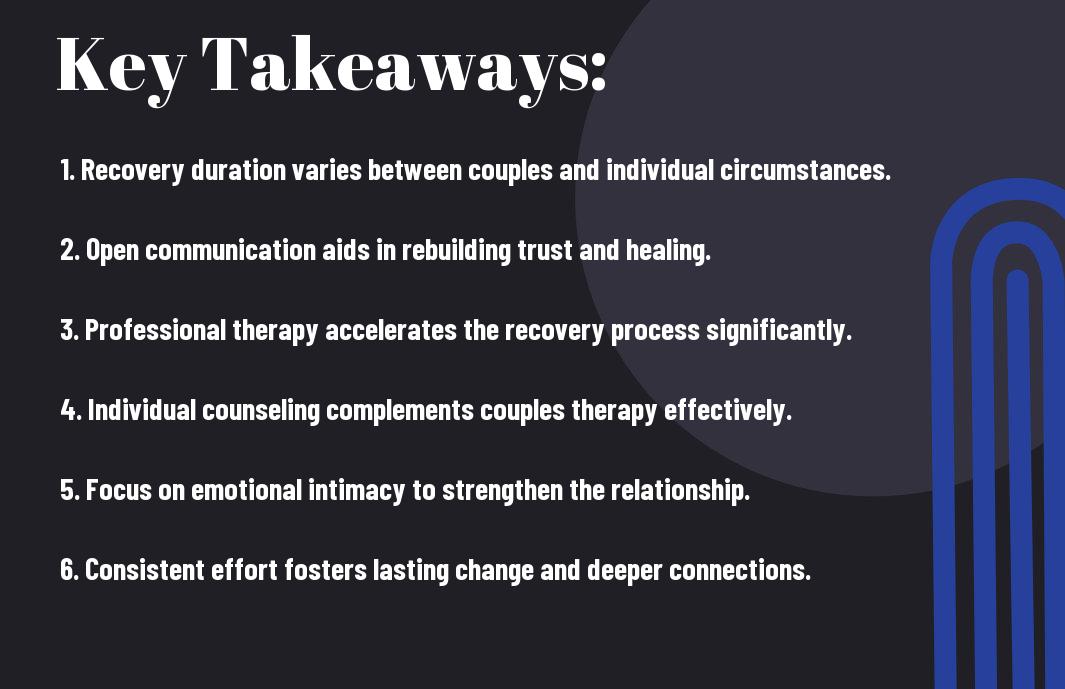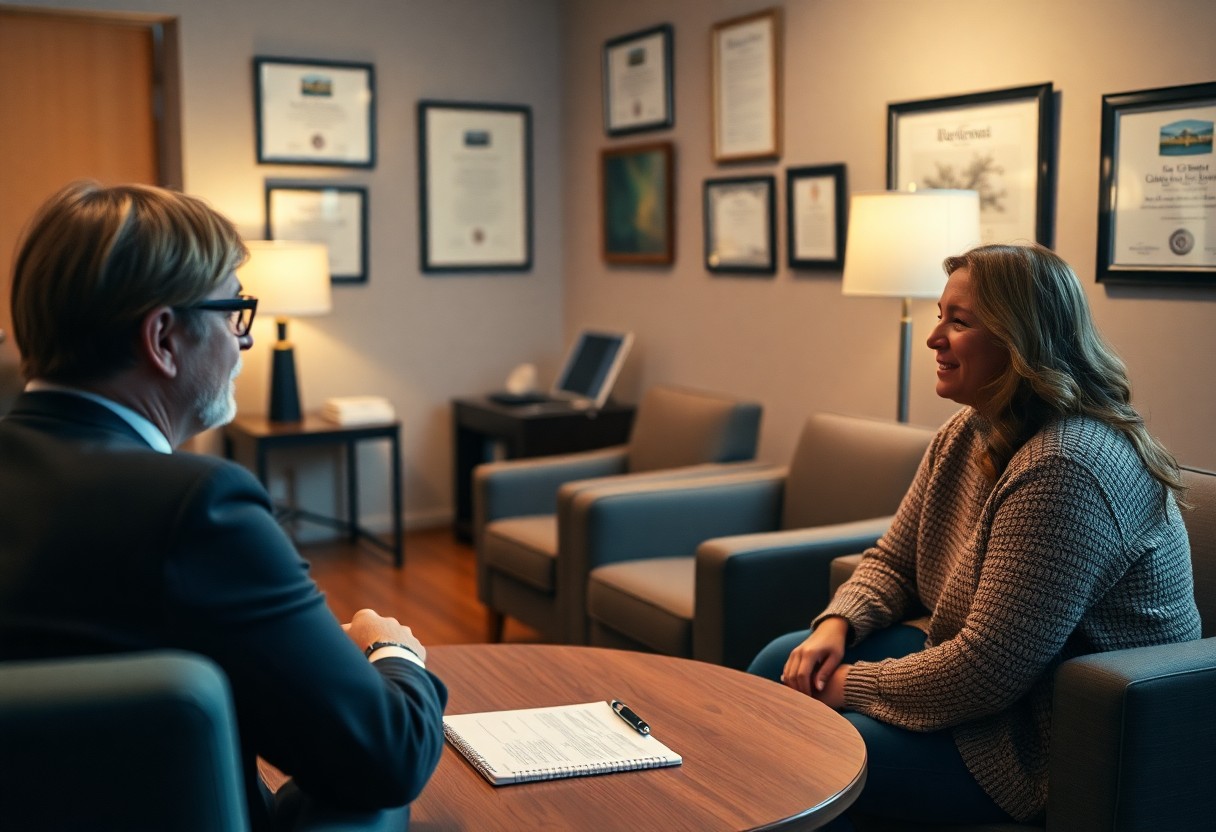Most people find that recovering from an affair is a complex process that can significantly impact your mental and emotional well-being. You may wonder how long this journey will take, and the truth is that it often varies based on several factors, including the depth of your relationship and your willingness to heal. Fortunately, there are effective therapy options available that can help accelerate your recovery, enabling you to restore trust and rebuild your relationship more swiftly. This post will outline the timeline for recovery and explore different therapeutic approaches to help you move forward.
Key Takeaways:
- Affair recovery varies widely, typically taking six months to two years depending on individual circumstances.
- Open communication between partners is crucial for rebuilding trust and understanding during the recovery process.
- Individual therapy can provide personal insight and coping strategies, while couples therapy focuses on relationship dynamics.
- Engaging in a structured support group can offer shared experiences and additional emotional support for both partners.
- Consistent commitment to the recovery process is vital, with both partners actively participating in healing activities and discussions.
- Setting realistic expectations about the timeline and outcomes of recovery helps manage emotional stress for both individuals involved.
- Professional guidance from therapists specializing in infidelity can help navigate complex emotions and facilitate healing more effectively.

Understanding Affair Recovery
To begin on the journey of affair recovery, it’s imperative to recognize that it is a complex process that varies from couple to couple. Healing requires patience and commitment from both partners. You must be willing to navigate the myriad of emotions and challenges that arise post-infidelity. By facing these issues head-on, you can begin to rebuild trust and foster a stronger relationship foundation.
The Emotional Impact of Infidelity
Recovery from an affair can elicit a whirlwind of emotions, affecting both partners profoundly. You may experience feelings of betrayal, sadness, and anger, while your partner grapples with shame and guilt. This emotional turmoil can lead to a breakdown in communication and trust, making the path to healing more challenging. It is vital to understand these emotional impacts and reach out for support as you work through them together.
Stages of Affair Recovery
Affair recovery involves several stages, each presenting its unique challenges and opportunities for growth. You may initially go through shock, feeling overwhelmed and uncertain about the future. As you progress, feelings of anger and grief often surface, followed by a phase of acceptance where you begin to confront your feelings and seek ways to heal. Awareness of these stages helps you navigate your emotions and fosters a connection with your partner as you work collectively towards recovery.
Infidelity can lead to varying emotional responses throughout the recovery process. Initially, you may face the shock of betrayal, prompting feelings of disorientation. The next stages often include anger towards your partner, coupled with grief for the loss of trust. Finally, as you move toward acceptance, you can explore opportunities for growth and healing as a couple. Understanding these stages allows you to recognize the emotional fluctuations and work together, fostering resilience in your relationship.
Factors Influencing Recovery Time
Even when you’re committed to healing after an affair, various factors can impact the recovery time. These include:
- The length of the affair
- Your couple’s history
- The level of trust in your relationship
- Each partner’s emotional readiness
- The effectiveness of therapy options
The more aware you are of these factors, the better positioned you are for recovery.
Length of the Affair
Any affair can leave deep emotional scars, but the length of the affair plays a significant role in your recovery journey. Brief encounters may result in less emotional entanglement, while long-term affairs can complicate feelings and attachments.
The Couple’s History
With your couple’s history being a significant factor, it’s important to assess the foundation of your relationship before the affair. Previous trust issues, past conflicts, and unresolved problems can accelerate or hinder recovery efforts.
Influencing your recovery timeline are the aspects of your relationship leading up to the affair. If you’ve faced frequent conflicts, communication breakdowns, or patterns of betrayal, you may encounter more obstacles on the path to healing. Conversely, a strong foundation of trust and communication can facilitate a smoother recovery process. Paying close attention to these dynamics can help prioritize what needs to be addressed to move forward effectively.

Therapy Options for Affair Recovery
For those navigating the tumultuous journey of affair recovery, exploring different therapy options is imperative. Individual and couples therapy can significantly impact your healing process. Each approach offers unique benefits tailored to address your specific emotional needs and relationship dynamics. Engaging with a qualified professional can help you understand your feelings, rebuild trust, and foster healthier communication patterns.
Individual Therapy
After experiencing an affair, you may find individual therapy particularly beneficial. This setting allows you to process your emotions at your own pace, uncover underlying issues, and develop coping strategies. A skilled therapist can help you gain insight into your feelings, enabling personal growth and healing, ultimately leading to a greater understanding of yourself and the factors that contributed to the affair.
Couples Therapy
Therapy can serve as a powerful tool in rebuilding your relationship after an affair. In couples therapy, you and your partner work with a trained counselor to address the underlying issues that may have contributed to the infidelity. You’ll learn to communicate openly, rebuild trust, and develop a deeper emotional connection. This process often involves discussing difficult topics, but it can lead to a more appreciative and strong bond if both partners are committed to the journey of healing.

Techniques to Accelerate Recovery
Once again, it’s important to recognize that every couple’s journey through healing is unique. Embrace various techniques to expedite your recovery process. For example, consider exploring Healing from Infidelity: Recovery Timeline Explained, which can provide valuable insights and strategies to help you navigate the ups and downs.
Communication Skills
At the heart of any successful recovery is the enhancement of communication skills. By openly expressing your feelings and ensuring that your partner feels heard, you lay the groundwork for deeper understanding and connection. Engage in active listening to cultivate empathy and validation, paving the way for healthy dialogue.
Building Trust
After an affair, rebuilding trust can feel like a daunting task, but it is entirely achievable with dedication and effort. You should focus on transparency in your actions and become more accountable, creating a safe environment for your partner to express their feelings. Establishing mutual expectations can also help in reinforcing a sense of security.
Even if the journey to rebuild trust may seem overwhelming, consistency in your words and actions is crucial. Engaging in honest conversations and addressing your partner’s concerns allows for emotional healing. Provide reassurance through genuine efforts, and share your emotional state regularly. Recall, trust takes time to rebuild, so celebrating small victories and staying committed to your progress can lead to a healthier relationship.
Challenges in the Recovery Process
Your journey towards healing after an affair is often filled with challenges that can hinder recovery. Each partner may experience a whirlwind of emotions, including guilt, anger, and confusion. It’s vital to navigate these feelings together, as the path to reconciliation requires open communication and a willingness to confront uncomfortable truths. Understanding and addressing these challenges head-on can significantly impact the recovery process.
Dealing with Trust Issues
Process rebuilding trust can feel like an uphill battle. Doubts and suspicions may linger, making it difficult to feel secure in your relationship. It’s important to set clear expectations and establish transparency, allowing each partner the opportunity to heal and regain confidence in one another.
Managing Resentment
For effective recovery, managing resentment is key to maintaining a healthy relationship. Holding onto feelings of resentment can derail your progress and lead to further conflict. Open dialogue about your feelings can facilitate healing, while also paving the way for a more trusting dynamic.
In fact, allowing yourself to express resentment in a constructive manner can help both partners move forward. It’s important to acknowledge the pain and anger associated with the betrayal, as suppressed emotions may resurface later, causing more harm. By addressing these feelings through joint discussions or therapy, you can transform resentment into understanding, ultimately strengthening your bond and paving the way for a renewed sense of trust and intimacy.
Realistic Expectations for Recovery
Now that you’ve initiateed on the journey of affair recovery, it’s important to hold realistic expectations. Healing from infidelity is often non-linear, with highs and lows along the way. Understanding that rebuilding trust and intimacy takes time can help you approach the process with patience and resilience, allowing space for both partners to navigate their emotions and challenges.
Timelines for Healing
After an affair, the timelines for healing can vary significantly depending on various factors, including the depth of the emotional connection and the willingness of both partners to engage in the recovery process. While some may find progress within a few months, for others, a year or more is realistic. Allowing yourself the time to heal is vital to ensure long-lasting change in your relationship.
Assessing Progress
Expectations for recovery should include regular assessments of your emotional and relational progress. Recognize that healing is not just about time; it’s about the quality of the interactions you have with your partner and the efforts you both put in. Periodically check in with each other about feelings and challenges, and how you’re addressing them. This ongoing dialogue is imperative for gauging whether you’re moving forward or encountering barriers.
A solid understanding of your progress can significantly impact the recovery journey. Look for improvements in communication, emotional vulnerability, and intimacy as positive signs of healing. Also, be mindful of setbacks; they are a natural part of the process. Regular evaluations can help you identify negative patterns that might arise, allowing you to address them promptly. By setting specific milestones with your partner, you set the stage for a healthier relationship moving forward.
To wrap up
So, as you navigate the complicated journey of affair recovery, keep in mind that the timeline can vary based on individual circumstances, but seeking therapy can significantly expedite the process. Engaging in couples counseling or individual therapy can help you understand your emotions, communicate effectively, and rebuild trust with your partner. By actively participating in therapy, you position yourself for a healthier relationship moving forward. Ultimately, the key lies in your commitment to healing and growth, both individually and as a couple.
FAQ
Q: How long does the affair recovery process typically take?
A: The duration of affair recovery can vary significantly among couples, depending on factors such as the depth of the emotional connection, the time spent in the affair, and the couple’s commitment to rebuilding trust. Typically, it can take anywhere from six months to several years. It’s important for both partners to engage in the healing process actively, ensuring that they communicate openly and work on their relationship in tandem.
Q: What are some signs that a couple is progressing in affair recovery?
A: Positive signs of progress during recovery might include improved communication, a willingness to discuss feelings openly, setting boundaries, the couple spending quality time together, and a rebuild of trust through consistent actions. Additionally, if both partners can express their feelings regarding the affair without blaming one another, it often indicates healing is taking place.
Q: What therapy options are available to help speed up recovery from an affair?
A: Couples may explore various therapeutic approaches, including Emotionally Focused Therapy (EFT), Cognitive Behavioral Therapy (CBT), and Imago Relationship Therapy. Seeking the assistance of a trained therapist can provide both partners with a safe space to express their feelings, improve communication skills, and learn strategies to rebuild trust. Group therapy may also offer insights from others who have experienced similar challenges.
Q: Can individual therapy be beneficial during affair recovery?
A: Yes, individual therapy can be extremely beneficial for both partners. It allows each person to process their feelings about the affair, work through personal issues that may have contributed to the situation, and develop coping strategies. Individual sessions can help each partner understand their emotional responses better and aid in their overall healing while still being committed to the collective recovery of the relationship.
Q: What role does communication play in the recovery process after an affair?
A: Communication is fundamental in the recovery process following an affair. Open, honest conversations can help both partners express their emotions, clarify misunderstandings, and work through conflicts. Ensuring that both partners feel heard and respected during these discussions fosters a safe environment for sharing feelings and can significantly facilitate healing. Establishing healthy communication patterns is a critical component in rebuilding trust and intimacy after an affair.
